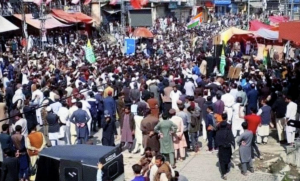ISLAMABAD, May 13: The situation remained tense in Pakistan-occupied Jammu and Kashmir on Monday as the total strike against high prices of wheat flour and inflated electricity bills and taxes entered its fourth day, with the Pakistan government stepping up efforts to de-escalate the situation following deadly clashes between security forces and protesters. The disputed region witnessed clashes on Saturday between the police and activists of a rights movement, leaving at least one police official dead and injuring over 100 people, mostly policemen. A complete strike has also been observed in the territory since Friday, bringing life to a halt.
Pakistan Prime Minister Shehbaz Sharif is expected to convene a high-level meeting on Monday to discuss the ongoing situation as the negotiations between the protesters and the state government ended in a deadlock.
The Jammu Kashmir Joint Awami Action Committee (JAAC), which has traders at the forefront in most parts of the region, has been seeking the provision of electricity as per hydropower generation cost in the region, subsidised wheat flour and an end to the privileges of the elite class.
A long march led by the JAAC left for Muzaffarabad, the capital of Pakistan-occupied Jammu and Kashmir, on Monday as the wheel-jam strike entered its fourth day.
The movement announced its march on Muzaffarabad after the talks between the JAAC core committee and Chief Secretary of the region Dawood Bareach ended in a stalemate.
A protest leader from Rawalakot accused the government of resorting to evasive tactics.
Protestors have already staged sit-ins, closing Kohala–Muzaffarabad Road at several locations, the Dawn newspaper reported.
Heavy contingents of police have been posted at roundabouts and sensitive locations, Markets, trade centres and educational institutes remain closed, while transport is suspended, reports said.
The so-called government called in the Rangers after clashes between the police and protesters erupted in Mirpur during demonstrations on Saturday.
Expressing deep concerns over the violent clashes between the police and the protesters, Prime Minister Sharif on Sunday said that there should be “absolutely no tolerance for taking the law into one’s own hands”.
The premier further said that he had spoken to the so-called Prime Minister of PoJK, Chaudhry Anwarul Haq, and also directed all Pakistan Muslim League-N office bearers in the region to talk to the leaders of the action committee.
“I urge all parties to resort to a peaceful course of action for resolution of their demands. Despite the best efforts of detractors, the matter will hopefully be settled soon.”
As part of his efforts to calm down tensions, President Asif Ali Zardari urged all the stakeholders to exercise restraint and resolve the issues through dialogue and mutual consultation.
He stressed that the political parties, state institutions and the people of the region should act responsibly so that hostile elements could not exploit the situation to their benefit.
The president highlighted that the demands of the people in the region should be addressed as per law, adding that he would take up their grievances with Prime Minister Sharif to find a way out of the current situation.
The president regretted the current situation and offered condolences over the unfortunate death of the police officer and prayed for the swift recovery of all those who were injured in recent clashes.
As part of his efforts to calm down tensions, President Zardari urged all the stakeholders to exercise restraint and resolve the issues through dialogue and mutual consultation.
On Saturday, the violent protesters damaged multiple vehicles, including a magistrate’s car on the Poonch-Kotli road. Moreover, markets, trade centres, offices and schools and restaurants remained closed across the region.
Police also launched a crackdown against the protesters after the violence, arresting dozens of individuals in Muzaffarabad.
A day earlier, the government also suspended mobile phone and internet services in different parts of the region.

